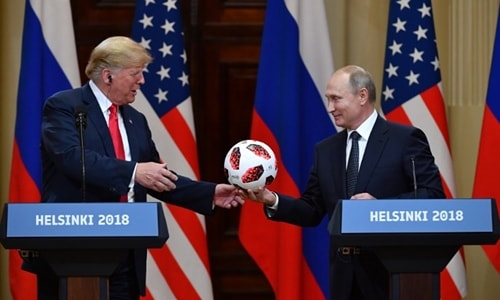Will Trump's son get to keep the soccer ball Putin gave him?
If the ball Putin gave him is valued at more than $390, Trump will have to pay to buy it back if he wants to give it to his youngest son.
|
Putin gave Trump a soccer ball during a conference in Finland on July 16. Photo:AFP |
When Putin gave Trump the World Cup ball during a joint press conference in Finland on July 16, Trump said he would give the gift to his son, Barron, because he is a soccer fan.
Seven years ago, German Chancellor Angela Merkel gave Obama's two daughters balls and some sports equipment, but neither girl got to keep them.Bloombergciting records of the US State Department's Office of Protocol.
The US Congress allows leaders to accept gifts from foreign governments as a courtesy. However, US law prohibits the president and his family from receiving gifts from foreign governments worth more than $390 (under Obama, it was $375). The US government in 2011 valued Angela Merkel's gift at $557.
So whether Putin's soccer ball makes it to Barron depends on how the US government values it. It's unclear whether Putin gave Trump a regular World Cup-issued soccer ball or one of the ones selected for use on the field.
Aaron Rothschild, senior auctioneer at Steiner Sports, said the ball would sell for around $160 at the store. However, match-played balls can fetch between $500 and $1,000. Balls used in important matches can fetch higher prices. For example, the ball used by Portuguese player Cristiano Ronaldo to score a goal sold for $2,000 to $10,000, according toWSJ.
If the value of a gift exceeds $390, the first family can keep the gift if they pay for it at market value. Hillary Clinton bought a nearly $1,000 pearl necklace given to her by Myanmar opposition leader Aung San Suu Kyi (now State Counselor and Secretary of State) when she was US Secretary of State in 2012.
If gifts are not purchased, they are considered state property and turned over to the National Archives. From there, many of them end up in the US presidential library museum collection.
In addition to the issue of pricing, the US is also very concerned about security factors. The US Director of National Intelligence confirmed that the soccer ball Putin gave was carefully searched. Some US lawmakers expressed concern that it contained eavesdropping equipment. This concern is understandable when looking at the bumpy relationship between the US and Russia.
In 1945, a Soviet school presented the US ambassador to the country, Averell Harriman, with a wooden replica of the US seal as a gesture of friendship towards allies in World War II. Harriman displayed it in his office for six years until he discovered that it contained a microphone and could be activated by an external signal.
In some cases, the US has had to get creative with special gifts. In 2013, Mr Putin’s then-wife, Lyudmila Putina, sent US first lady Michelle Obama a birthday gift of flowers so large it couldn’t fit through a metal detector.So White House officials simply took a photo and sent it to Michelle so she could see the gift and thank Mrs. Putina.
“The more unusual the gift, the more creative you have to be,” says Bradley Blakeman, a former senior White House staffer. “The key is to be polite when accepting a gift and hope the giver never asks where it is.”


